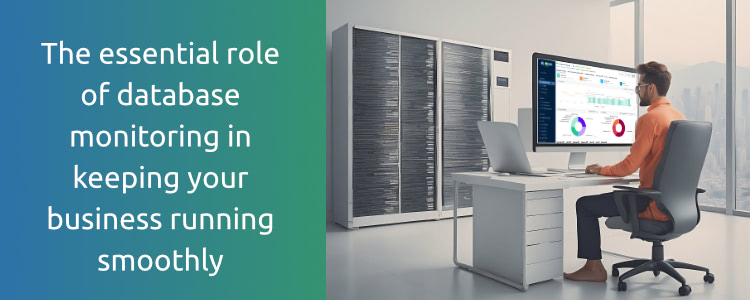The essential role of database monitoring in keeping your business running smoothly

Let’s face it: any downtime or sluggish performance from your database can directly hit your business’s bottom line. This is where tools like DBmarlin step in, offering a safety net and a playbook for proactive maintenance. Here’s the real talk on why keeping a vigilant eye on your databases through monitoring tools is more than just a technical checkbox—it’s a critical business strategy.
1. Catch problems before they snowball
Database monitoring offers a multitude of benefits, one of the most significant being the ability to identify potential issues at an early stage. Monitoring a variety of key performance indicators, such as query response times and the usage of system resources are essential in evaluating the overall health and efficiency of a database system.
DBmarlin is a tool designed to facilitate this process. The real value of this monitoring comes from its capacity to flag any unusual or aberrant activity at the earliest possible stage. By doing so, it enables you to address and rectify these issues promptly. This early detection and resolution prevent minor issues from escalating into major, often costly problems. It saves both time and resources, making it an invaluable aspect of database management.
2. Keep things running smoothly
Nobody enjoys dealing with a slow database. It not only frustrates the users but also hampers the overall productivity and efficiency of work operations. To overcome this issue, continuous and effective monitoring of your database becomes crucial. This is where DBmarlin comes into play.
With DBmarlin, you have the ability to drill down into the intricate details of your database’s performance. It allows you to understand what’s working in your favour and what’s not, and make the necessary adjustments. With its comprehensive monitoring capabilities, you can identify slow queries and potential bottlenecks that are hindering the performance and speed of your database. By identifying and tweaking these problematic areas, you can ensure your database continues to operate smoothly, keeping up with the demands of your operations and maintaining its optimal speed. The ultimate goal is to keep your database humming along at full speed, providing an efficient and seamless user experience.
3. Smart scaling
Having a comprehensive understanding of the ebb and flow of your database’s requirements is absolutely vital for the effective management of resources. This invaluable data can provide you with a clear picture of how your database’s needs have changed and evolved, making it significantly easier to make accurate predictions regarding future needs. You’ll be able to anticipate when you’ll need to increase power to handle a heavier workload, or when it’s safe to dial it back, thereby optimising cost and capacity.
DBmarlin is a tool that is designed to assist with this, as it is capable of tracking your database’s historical data and usage patterns over time. This mindful approach to resource management ensures you won’t have to make any sacrifices when it comes to the performance of your database.
4. Guard your data
Databases are akin to treasure troves, brimming with valuable information that is crucial to the functioning and success of a business or organisation. As such, they need to be protected with the same level of stringent measures that one would employ to safeguard a bank vault. The importance of this cannot be overstated, as data breaches can not only lead to significant financial losses but also to a severe dent in an organisation’s reputation. Therefore, adopting robust security measures is non-negotiable.
One such measure is consistent and thorough monitoring. Through vigilant monitoring, one can be alerted to unauthorised access attempts or potential breaches in a timely manner. This allows for prompt action to be taken, thereby ensuring that your data remains secure. Moreover, monitoring also ensures that you are in compliance with the regulatory standards that your business is subject to. These standards are often legal requirements, and failure to meet them could result in penalties. Therefore, diligent monitoring contributes to both data security and regulatory compliance.
5. Faster recovery
In the unfortunate event that things don’t go as planned, having a comprehensive understanding of precisely when and how the performance of your database degraded can be instrumental in facilitating a swift and less stressful recovery.
This is made possible through the use of DBmarlin’s detailed activity data. This data provide a wealth of information that can be utilised to quickly identify and diagnose any issues that may have arisen. By doing so, you can implement the necessary fixes and get your system back online with minimal disruption and fuss. The ability to quickly recover from such incidents can be crucial in preventing further issues and ensuring the smooth operation of your system.
6. Make Better Business Decisions
When you have a clear view of your database’s inner workings, you can make sharper, more informed business decisions. Whether it’s planning for future growth or deciding on tech upgrades, the insights from your database monitoring are invaluable. They help you stay agile and informed, ready to pivot as your market or technology evolves.
Bottom line: database monitoring is more than just an IT concern; it’s a cornerstone of modern business operations. Investing in a robust tool like DBmarlin keeps your database performing well and supports your business’s overall health and growth.

